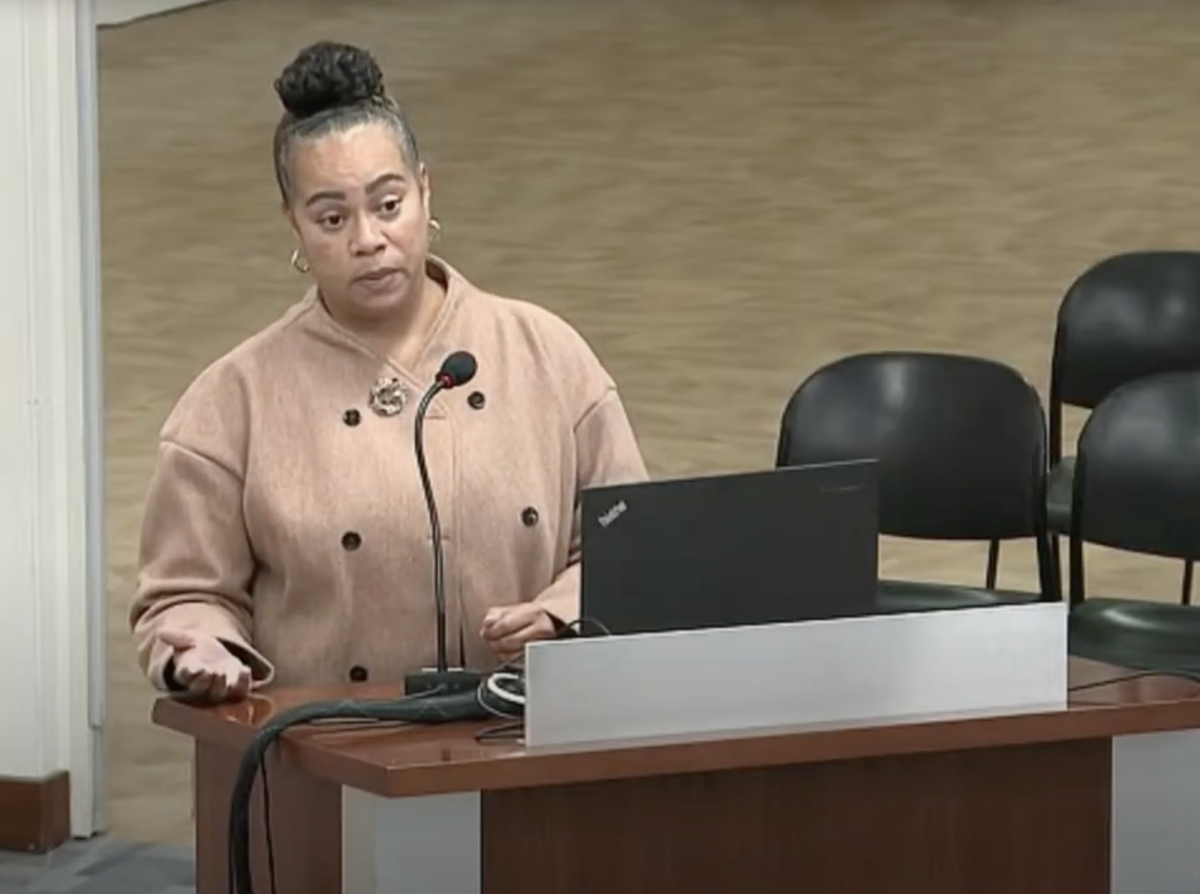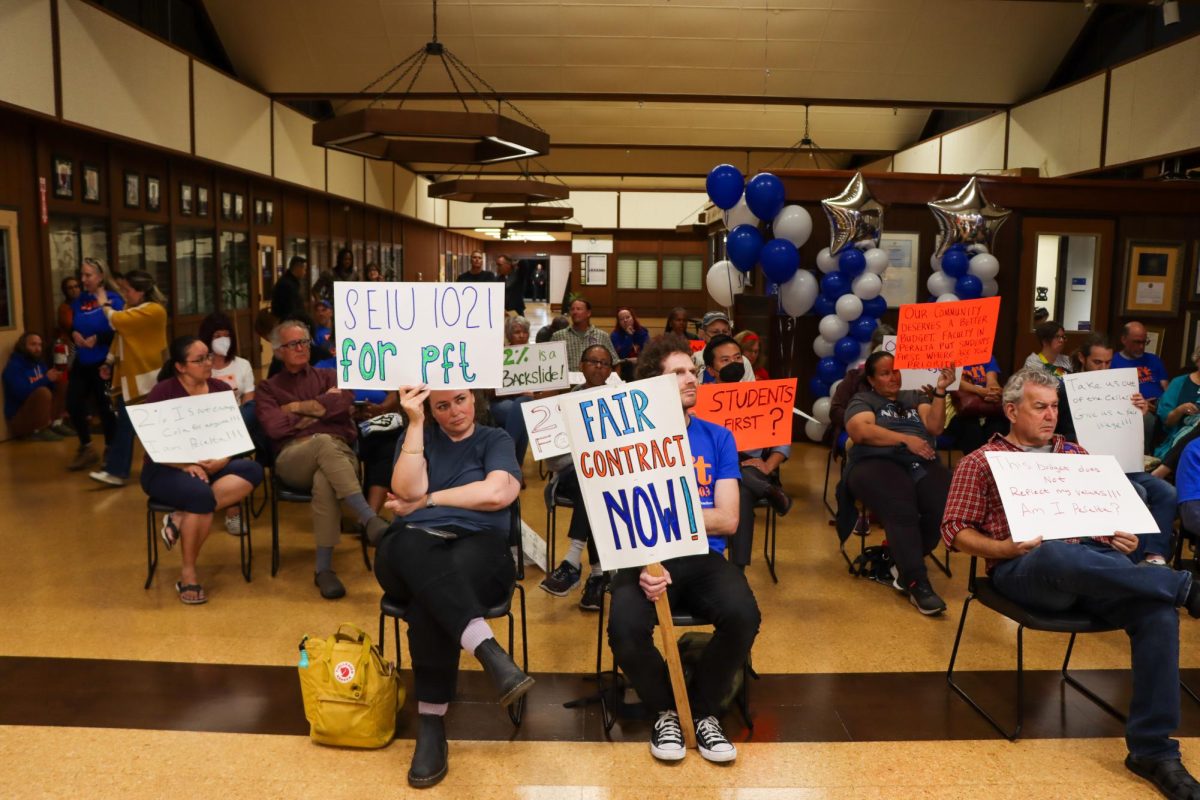When state funding for California Community Colleges included a 8.22% cost-of-living adjustment to account for rising inflation, faculty at the Peralta Community College District wanted to see the $11.2 million in funds used towards employee cost-of-living raises. But officials in charge of managing Peralta’s difficult financial situation determined that granting cost-of-living raises of any amount would still require substantial cuts elsewhere in the budget.
After a semester-long push and pull, involving a union rally, a surprise during negotiations, and a search for an unexpected $6.2 million in budget cuts, the district awarded 7% cost-of-living raises to all its employees, but not without a massive hiring freeze.
Original budget includes 2% “placeholder” COLA
In a May revision of the state’s 2023-24 budget, Governor Gavin Newsom allocated a historic 8.22% Cost of Living Adjustment (COLA) for California Community Colleges. The COLA is “intended to offset the effects of inflation,” according to the California Community Colleges Chancellor’s Office. The institutions themselves decide how funds are used.
The Peralta Community College District (PCCD) received $11.2 million in state COLA funds, but only earmarked 2% cost of living raises for its employees in its initial budget for the 2023-24 fiscal year.
PCCD’s Interim Vice Chancellor of Finance and Administration, Nathaniel Jones III, presented the proposed budget to the Peralta Board of Trustees for a first reading at the Sep. 12 regular meeting.
Jones’ presentation noted that the 2% “is a placeholder for salary increases but does not dictate the District’s position in negotiations with labor partners.” He stated that his team would re-submit an amended budget to the state chancellor’s office if the COLA rate changes during negotiations with unions.
In a Sep. 20 interview with The Citizen, Jones stated that while some other community college districts in California were able to give their employees full COLA pay increases, PCCD was not in good financial positioning to do so.
“Even with zero COLA, our costs [would exceed] our revenues,” he said.
Faculty union protests the 2%
At the following Board of Trustees meeting on Sep. 26, where trustees were set to formally vote on the proposed budget, over fifty disgruntled members of the Peralta Federation of Teachers (PFT), the district’s faculty union, flooded the boardroom to protest the COLA allocation.
Faculty took turns speaking during the public comment section of the meeting to advocate for higher cost-of-living raises.
“This two percent cost-of-living-adjustment is a pay cut with inflation over the last two years,” Michael Seidel, a part-time Computer Information Systems instructor at Berkeley City College, said.
Many protesters, including Karyn Panitch, a part-time instructor at Laney College’s English for Speakers of Other Languages Department, referenced a study conducted by the California Federation of Teachers in August, which ranked PCCD 72 out of 72 for lowest paying California Community College district for new full-time faculty with Masters’ degrees. PCCD also ranked 71 of 72 for full-time faculty with a Master’s and over 10 years experience.
“Approving the 8.22% COLA [toward salary increases] is really just the bare minimum that needs to happen for us to move up and out of that unenviable position,” Panitch said during her public comment.
The board approved the budget without modifications to ensure the district met the Sep. 30 deadline for submitting a budget to the state chancellor’s office – or else the state funding would be put at risk.
“I feel like it’s an ultimatum coming into the board, because we have to pass it, and we have no real choice to pass it,” Board Vice President Louis Quindlen said, before the board moved unanimously to approve the budget.
Surprises in negotiations lead to 7% raises for all
While the budget itself was approved, the COLA was still up to negotiations between PCCD and employee constituency groups.
The International Union of Operating Engineers, Local 39, which represents stationary engineers at PCCD, initially had negotiated a contract with the district to receive a 7% COLA. According to Interim Vice Chancellor of Human Resources and Employee Relations, Ronald McKinley, this was because of a previous Local 39 contract that gave them the right to 85% of state-funded COLA.
A member of Local 39 declined to comment when asked about their negotiation process with the district. The Citizen has been unable to locate the specific language in Local 39 contract that resulted in the 85% COLA award.
Due to a “Me Too” clause within certain employee group’s contracts, whenever one group gets a set pay raise for their members, the members of other Peralta employee groups are also entitled to receive that same raise. The clause exists in the contracts for PFT, Local 39, and the Service Employees International Union, Local 1021 (SEIU), which represents most of PCCD’s classified workers.
This came as a surprise to some constituency groups during negotiations.
“When we sat down and started talking and got to 7%, we were surprised,” PFT President Jeff Sanceri said.
It was even a surprise to district officials.
“We did not know when we did the tentative budget that the bargaining unit agreement included an 85% COLA,” Interim Chancellor Jannett Jackson stated during a Dec. 12 Board of Trustees meeting. “We found out during the months after that to see if we could go back to Local 39 […] to see if they would consider a change, and they did not.”
The result was 7% raises for all PCCD employees. The pay will be given retroactively, in this case meaning that the raise applies to hourly wages as far back as July of this year. This includes both salary and benefits. The raise in pay also applied to managers and administrators.
$6.2 million in budget revisions
Awarding the higher raises resulted in a new $6.2 million deficit. Due to the cost, the district deemed that cuts elsewhere in the budget needed to be made.
“We are not ruling anything off the table,” Jones said when talking about how they will handle the budget crisis during an interview with The Citizen, on Nov. 14.
At the Dec. 12 Board of Trustees meeting, Jones brought forth the revised budget to the board for approval.
$4.7 million of the deficit will be recovered by a hiring freeze of 36 vacant positions. This, combined with $5.5 million in frozen positions in the initial budget sent to the state back in September, means that a total of $9.2 million worth of positions will be frozen in the final budget.
“Given the fact that the deficit was largely the product of personnel,” Jones stated, “we thought that it made sense to allocate the deficit by personnel.”
A majority of the positions affected by the revisions include faculty and classified staff.
This was “not by design, but purely by happenstance because of the fact that we made the decision to minimize the impact to operations by using vacant positions,” Jones said, when acknowledging criticisms that some groups were “shouldering more of the burden” in the budget cuts.
The remaining roughly $1.5 million in cuts were “one-time” reductions, including adjustments to discretionary spending, which is leftover funds that each college can use on non-committed items, such as office supplies, books, or electronics.
According to budget reduction proposals presented during a Dec. 8 Planning and Budget Council meeting, a small portion of the money will also be taken from reserves, which are funds that the district sets aside each fiscal year to save for later use.
As the pay increases will continue to cost the district in future years, the one-time reductions this year won’t address the deficit in subsequent years.
The board approved the revised budget after much discussion. Board President Paulina Gonzalez-Brito expressed concerns about whether constituent groups at PCCD had the adequate opportunity to provide input. Jones replied that although Peralta’s shared governance bodies didn’t vote on the revisions, they did have the opportunity to provide input and brainstorm ideas. He also mentioned that an ad-hoc subcommittee would be established to look at comments and make actionable proposals.
“So we heard you, and we’re making those efforts in order to make the overall budget development more inclusive, [and] expand the timeline to allow for more dialogue discussion and idea generation,” Jones said.
Written by Sam O’Neil and Li Khan. Ivan Saravia and Lylah Schmedel-Permanna contributed reporting.
Correction 12/25: Original article stated that state funding was $11.9 million; this was a typo from the actual $11.19 million, which has now been rounded up to $11.2
































Mary Shaughnessy • Jan 3, 2024 at 9:43 am
Very informative. Thank you for this reporting.